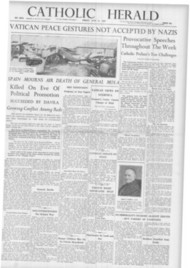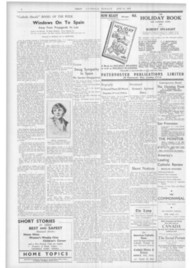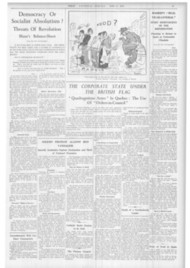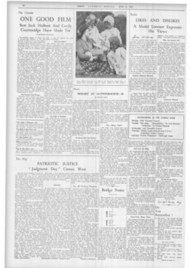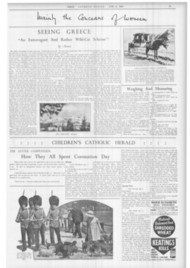Page 10, 11th June 1937
Page 10
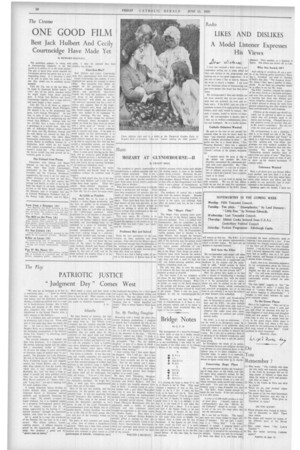
Report an error
Noticed an error on this page?If you've noticed an error in this article please click here to report it.
Tags
Share
Related articles
Workers' Bishop Middle Class
Priest's Spirited Answer To Mr. Butler's Schools' Letter
Love For The Cardinal's Enemies
Catholics And The Colour Bar
If We Fight For The Principles Of St. Catechism
The Play
PATRIOTIC JUSTICE Judgment Day " Comes West
" We who are so fortunate as to live in a totalitarian stale . . . " draw no distinction between our duty to our country and justice, says the diabolical prosecutor during a framed-up political trial in a capital in South-Eastern Europe: this is both setting and purpose of Mr. Elmer Rice's play, Judgment Day, which was recently transferred to the Strand Theatre after a short success at the Embassy.
It is a brilliant play and certainly merits its promotion and a long run. Three solid acts of trial scene may seem too much, but this -the trial of three members of the People's Party on a trumped-up charge of the attempted assassination of the Dictator (Long Live Vesnicl) --is absorbing, exciting and ominous.
The corrupt witnesses are bullied into their false testimony. It is imperative for the already tottering regime that the judges find a unanimous verdict of " Guilty." At all costs the judges (a good assortment of character types of justice) must be persuaded. The prisoners are Lydia Kuhman, the wife of the leader of the illegal People's Party (Catherine Lacey, she acts magnificently), her friend, Khitov, and a doped, idiot alien (shades of Van der Lubbe—the whole play is very reminiscent of the Reichstag fire Ilia] but there is little attempt to parody any other political trials). They are very well played, but Khitov's (Eric Berry) outbursts of " Down with's " and " Long live's " are out of keeping with his usual sardonic front.
A young American lawyer (brother of Lydia) defends them, expressing pious American horror at European judicial methods, and, incidentally, disclosing the play's origin. He soundly re-argues the bogus evidence, but it is rendered useless by a gorgeous Georingesque general who cows the judges, witnesses and all, till things, aggravated by the hurling of an infernal machine " through the courtroom window, look black for the prisoners.
All is saved by a coup —the overthrow of the Dictator (far too testy to be a real tyrant). This climax achieves breathcatching tension. A difficult situation is solved by the honourable old die-hard judge, who produces a pistol and his "quarry cats on havoc," How much is satire and how much is show up, of justice in dictator-ridden countries is hard to tell. What matters, at the moment, is the play, and. this is exceptionally good—at moments tremendous.
J. G.
lolanthe
We must beware of America. lest that land should strive, by temptation, to take too much from us, The D'Oyly Carte Company has but recently returned from another triumphant visit to the States, and whisper has it that there are some of the members who are much taken by the amenities of that great land and would gladly have made a longer acquaintance. Fortunately for Gilbert and Sullivan's creative soil, the company is hack in London once more, delighting audiences of all ages with those famous comic operas which, like the fairies in lolanthe, never grow old.
The fairies in lolanthe. It was that tripping and, vocally, somewhat over-assertive band whom we chose, last Friday, to give us our first renewed glimpse of Gilbert and Sullivan at the curtain's rising at Sadler's Wells. " We are dainty little fairies," they told us. Well, as to that, the daintiness and charm need not be challenged; but little, not always. " You are a fine figure of a woman." Gilbert remarks to one of his characters elsewhere. So might Strephon, a week ago, have complimented more than one of his aunts.
Most of the cast was familiar, and the exccutants, for the greater part, were in splendid voice. It was not surprising that Darrell Fancourt's fine rendering of the House of Peers song in the second act earned the distinction accorded, as we know, to one of the Lord Chancellor's pronouncements from the Bench, that of a double encore. Evelyn Gardiner was new to us in the role of the fairy queen; she, too, was part of the evening's richest on the vocal side.
The peers, in their coronets and sweeping robes, were of course a magnificent spectacle. There was a time when nobody would have expected to see noble lords habited and crowned in glory unless at a performance of lolanthe, Coronation year has translated the picture, for a brief space on a great day, to Westminster Abbey and to real fife, The one thing which it was not given to their lordships to do, on that occasion was to "depart dignified and stately." That is where Sadler's Wells beats
them! A.
Yes, My Darling Daughter Discussing with a friend, the other day, current dramatic productions, I ventured to remark that I considered the title of the new play at the St. James's Theatre, Yes, My Darling Daughter, a singularly silly one, as it did not convey the slightest hint as to the character of the play. "On the contrary," replied my friend, " I think it particularly appropriate. Don't you know," he proceeded, " that Yes, my darling daughter ' is part of a rhyme in which a mother lectures her daughter on the proper decorum when bathing?'
I must confess that I had never heard the doggerel. This I will say: that it was by no means a nursery rhyme, and the play is most certainly not for les jeunes filler. Not for one minute can I recommend it as a lit entertainment for young people. The pity of it is that rarely have so many first-class players been brought together in so small a cast.
We have Sybil Thorndike, Margaret Bannerman, to say nothing of Leon Quertcrmaine and Evelyn Roberts. Still the play is frankly just stupidly immoral from start to finish. It centres round an attractive mother with a past (Sybil Thorndike) who tries to save her daughter without success from spending an unchaperoned weekend with a young man about to leave for an extended period abroad. There is a friend (Margaret Bannerman) who has apparently made a hobby of getting divorced, and who volunteers advice I founded on experience to the truant young
lady (Jessica Tandy). Then there is a bovine type of husband (Evelyn Roberts) specially gifted in putting his foot into things, and a naïve bachelor friend of the family (Leon Quartermaine), benevolently, rakish and seemingly most anxious to keep some sort of a plot going until the final fall of the curtain,
WALTER a BECKETT.
blog comments powered by Disqus


